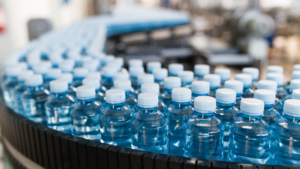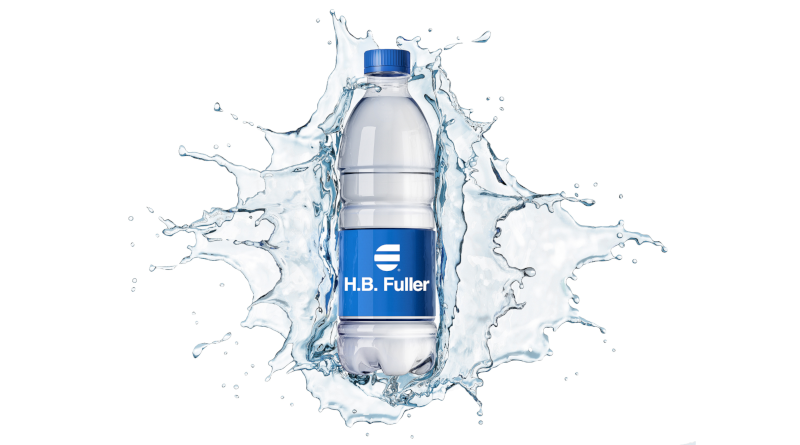Advances in adhesive technology
Enabling PET bottles to achieve circularity
Changes in the food and beverage packaging sector never stop, with new materials, design updates, and sustainability demands creating challenges for manufacturers and suppliers alike. However, many believe the race to produce even thinner and low weight PET bottles might be reaching its limits with PET per litre of bottled water reaching an all-time low. Adhesives play several crucial roles, from helping to ensure the recyclability of the package and bottle, to product security, extending shelf life, and reducing waste. That is also why adhesive formulations add value to this industry while providing the necessary versatility to perform across different applications and in various production environments.
For the PET bottle recycling stream, it is paramount to have the best possible collection, sorting and cleaning process to reach the highest possible quality. The entire chain, starting with the consumer participating in the collection within a separate and dedicated stream for PET bottles, reduces the need for sorting. Cleaning the PET bottles to free them from leftover liquids, labels, and adhesives is a key step in the process. A hot alkali bath washes off specifically formulated adhesives for this purpose and removes any contamination from previous filling goods. The wrap-around and full surface label adhesives are customised for efficient wash-off and are certified by third party bodies. Qualification requirements for certification bodies in Europe, the U.S., and other countries such as South Korea, South Africa, or Australia can differ somewhat.
Plastic waste reduction and leakage into the oceans is on the top of the agenda of the international community with on-going United Nations negotiations to end plastic pollution and finalise a legally binding document by the end of 2024 to this effect. Considering the trends and these international forces, certification bodies are seeking greater cooperation and are working towards mutual recognition of testing institutes and possibly testing protocols and certifications. International brands seek to use packaging components that are certified for as many geographies as possible to satisfy the export strategies of international products, highlighting the need for greater international coordination.
How can adhesive suppliers support beverage manufacturers using PET bottles?
As a well-known adhesive manufacturer worldwide, H.B. Fuller provides global support while working to qualify and certify products for local markets across the world. The alkali wash-off labelling product line, H.B. Fuller Earthic 4001 and 4010, are wrap-around labelling grades for plastic labels on PET bottles that are available on a global scale. The company’s international technical teams are working with local certification bodies to obtain further wash-off assessments. To date, H.B. Fuller has the following certifications for Europe: PET Cycle, Returpack, and Veolia. In addition, the U.S. team is working on the Association of Plastic Recyclers (APR) approval process. Also, in other regions, Fuller’s experts are teaming up with customers to follow recognised standards and finalise certifications that assure the right the way in the markets served.

H.B. Fuller works directly with supply chain associations such as RecyClass, APR, or Australian Packaging Covenant Organisation (APCO) to cooperate with industry partners on design for recycling guidelines and testing protocols. The input from an adhesive supplier is particularly important as adhesives, and especially wrap-around labelling adhesives on PET bottles, have a huge impact, even though they are a small component of the overall packaging. When considering the circular nature and key success factors of PET bottle-to-bottle recycling, adhesives play a crucial role in ensuring high quality, direct food contact approved for PET production.
As with any other business, recyclers are seeking to run the most efficient process as possible, paying close attention to water and energy usage of their own operations. The cleaning of PET bottles is an essential step of the PET recycling process when any remaining liquids, labels, adhesives, and any other contamination need to be removed. Thus, an easy and effective label removal and wash-off is paramount to a state-of-the-art recycling process.
H.B. Fuller said that they are now focusing on creating smart materials and systems that reduce costs, improve efficiency, and make products more sustainable. Advanced technologies like H.B. Fuller Earthic 4001 and 4010 need to be specifically formulated to enable easy wash-off.
Elizabeth Staab, Global Packaging Sustainability Manager, H.B. Fuller, says: “We believe the next step in development is how to reduce the overall carbon footprint. Thus, with careful selection of appropriate raw materials and efficient manufacturing practices, more sustainable solutions can be achieved in future. One thing is for sure, innovation does not occur in a vacuum, but at the interface of customers, equipment, substrate suppliers, and technical services.”

